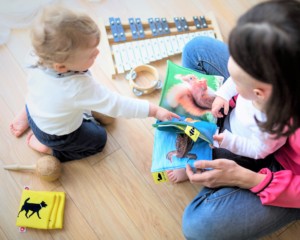Expressing ourselves is a fundamental skill that plays a big role in daily life. Speech and language impacts a child’s emotional and social development. How can a parent or caregiver help a child struggling with communication? When should a parent be concerned?
Here are a few ways to help develop speech and language skills
 Read
Read
Read out loud, it can be anything, not just kids books. The latest cookbook, the news, or magazine. It is well documented that early reading builds literacy later in life.
Dr. Andrew Meltzer, Department of Psychology at University of Washington, found “that young children who follow the direction of an adult’s gaze pick up more vocabulary in the first two years of life than children who do not track these eye movements.”
Mimic
Before your baby is six months old, they will start mimicking your sounds and face. You can even start copying your baby, it won’t be long till you both are laughing. Try animal or fun sounds, either way they are using the muscles need to develop language. A study at the University of Washington found, not only did babies loved being imitated, it allowed them to practice new skills and motivated them
Repetition
Saying the same words over and over again helps toddlers learn vocabulary quicker and encourage language development. Pathways shares a few examples:
 For example, if you’re trying to teach your child the word “more,” you can say: “I have more milk! Do you want more? Let’s put more milk in your cup!” By saying the word more three sentences in a row, we provide repeated exposure.
For example, if you’re trying to teach your child the word “more,” you can say: “I have more milk! Do you want more? Let’s put more milk in your cup!” By saying the word more three sentences in a row, we provide repeated exposure.
Place emphasis on the word you want your little one to use! Yes, you can repeat the word, but your toddler is more likely to pay attention to the word if you make it stand out from the rest. Slow down and exaggerate the word you want your child to notice. If the word applies to an emotion, change the tone of your voice to help express the meaning.
Use gestures, actions, or objects when you say the word! The more meaning you can attach to a new word, the better. Linking a new word to a gesture, action, or object is one more way that you can help your child learn new vocabulary. Some examples of this are:
-
-
- Say “open” while you open a box!
- Shake your head “no” while you say the word.
- Hold your arms up while you say “up!
-
If you suspect your child may have a speech or language disorder, take the first step. Contact First Words Speech Therapy, we provide a comprehensive evaluation for a variety of speech, language, and occupational needs. We are dedicated to providing personalized care to meet your child’s speech and language needs.


